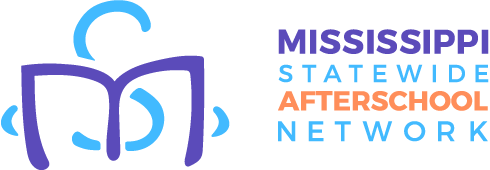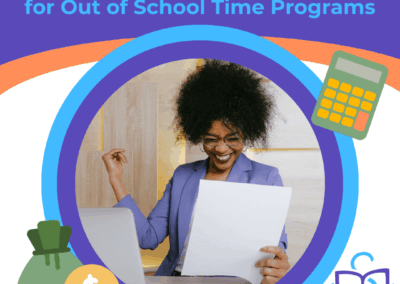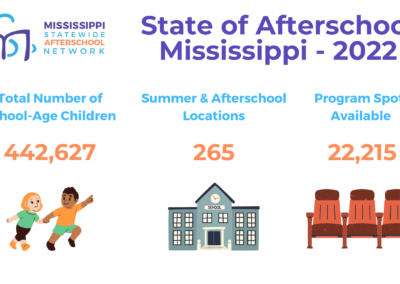America After 3PM
America After 3PM
In Mississippi, unmet demand for afterschool programs has increased since 2014, with more than 221,000 children who would be enrolled in a program if one were available to them. Demand for afterschool in Mississippi surges as parents see key benefits from afterschool, including keeping kids safe, helping them learn and grow, and providing peace of mind for working families. As families face barriers to participation, such as cost and accessibility, there is strong support behind public funding for afterschool programs in the state.

Demand
The number of children left without afterschool in Mississippi is high.
221,535 (53%) kids would participate in an afterschool program if one were available to them in 2020.

Benefits
Mississippi children who are fortunate enough to take part in afterschool programs are receiving critical supports.
88% of parents are satisfied with their child’s overall afterschool program experience.
Challenges
Cost and access top the list of roadblocks to afterschool program participation.
48% of parents report that afterschool programs are not available in their community.

Support
There is significant bipartisan support for greater investment in afterschool.
Mississippi parents are overwhelmingly in favor of public funding for afterschool programs.


Summer
Summer enrichment programs can be a game changer for young people. But unmet demand remains high.
There were 86,923 children (18%) in a structured summer experience during the 2019 summer.

STEM
Mississippi afterschool and summer programs provide hands-on STEM learning for students to explore, learn, and grow. But, too many young people are missing out.
There are 48,363 children with STEM learning opportunities in afterschool programs.
America After 3PM National Report
The Afterschool Alliance’s 4th edition of America After 3PM provides a detailed account of children in the afterschool hours, identifying: trends of participation in, and unmet demand for, afterschool programs; the experiences and opportunities programs afford; and which children and families are missing out, and why.
Latinx Communities After 3PM
Unmet demand for afterschool programs is high nationwide in 2020, but it is especially high among Latinx children: 55 percent of Latinx children not in an afterschool program would be enrolled if a program were available. Demand for afterschool surges as Latinx parents see key benefits for afterschool, including keeping kids safe, helping them learn and grow, and providing peace of mind for working families. While Latinx families face greater barriers to participation, such as cost and accessibility, there is strong support behind public funding for afterschool programs.
Black Communities After 3PM
Unmet demand for afterschool programs is high nationwide in 2020, but it is especially high among Black children: 58 percent of Black children not in an afterschool program would be enrolled if a program were available. Demand for afterschool surges as Black parents see key benefits for afterschool, including keeping kids safe, helping them learn and grow, and providing peace of mind for working families. While Black families face greater barriers to participation, such as cost and accessibility, there is strong support behind public funding for afterschool programs.
In Mississippi, unmet demand for afterschool programs has increased since 2014, with more than 221,000 children who would be enrolled in a program if one were available to them. Demand for afterschool in Mississippi surges as parents see key benefits from afterschool, including keeping kids safe, helping them learn and grow, and providing peace of mind for working families. As families face barriers to participation, such as cost and accessibility, there is strong support behind public funding for afterschool programs in the state.
Demand
The number of children left without afterschool in Mississippi is high.
221,535 (53%) kids would participate in an afterschool program if one were available to them in 2020.

Benefits
Mississippi children who are fortunate enough to take part in afterschool programs are receiving critical supports.
88% of parents are satisfied with their child’s overall afterschool program experience.

Challenges
Cost and access top the list of roadblocks to afterschool program participation.
48% of parents report that afterschool programs are not available in their community.

Support
There is significant bipartisan support for greater investment in afterschool.
Mississippi parents are overwhelmingly in favor of public funding for afterschool programs.

Summer
Summer enrichment programs can be a game changer for young people. But unmet demand remains high.
There were 86,923 children (18%) in a structured summer experience during the 2019 summer.

STEM
Mississippi afterschool and summer programs provide hands-on STEM learning for students to explore, learn, and grow. But, too many young people are missing out.
There are 48,363 children with STEM learning opportunities in afterschool programs.

America After 3PM National Report
The Afterschool Alliance’s 4th edition of America After 3PM provides a detailed account of children in the afterschool hours, identifying: trends of participation in, and unmet demand for, afterschool programs; the experiences and opportunities programs afford; and which children and families are missing out, and why.
Latinx Communities After 3PM
Unmet demand for afterschool programs is high nationwide in 2020, but it is especially high among Latinx children: 55 percent of Latinx children not in an afterschool program would be enrolled if a program were available. Demand for afterschool surges as Latinx parents see key benefits for afterschool, including keeping kids safe, helping them learn and grow, and providing peace of mind for working families. While Latinx families face greater barriers to participation, such as cost and accessibility, there is strong support behind public funding for afterschool programs.
Black Communities After 3PM
Unmet demand for afterschool programs is high nationwide in 2020, but it is especially high among Black children: 58 percent of Black children not in an afterschool program would be enrolled if a program were available. Demand for afterschool surges as Black parents see key benefits for afterschool, including keeping kids safe, helping them learn and grow, and providing peace of mind for working families. While Black families face greater barriers to participation, such as cost and accessibility, there is strong support behind public funding for afterschool programs.









